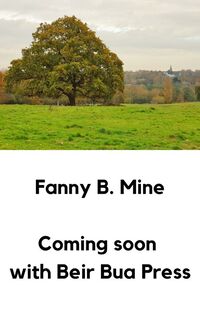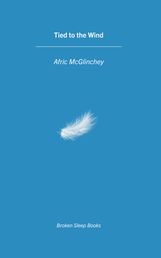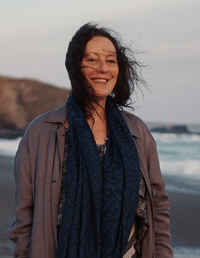 I am excited to announce that my new poetry collection, Fanny B. Mine, will be out with Beir Bua Press in October 2021! Fanny B. Mine is an exploration of John Keat's and Fanny Brawne's relationship through a modern-day lens, i.e.: it examines what would happen if they met today. It's an experimental series of responses, interpretations, visual poetry and letters. It was a lot of fun to write and I love the journey that unfolds through the collection. As a side note, I have huge respect for Keats and he was a big influence for me as a young writer growing up next to Hampstead Heath. In English class, I would look over the Heath (which was next to my school) and think about Keats wandering around and writing about what he saw. It was really inspiring but at the same time, when I read the letters he sent Fanny Brawne and some she wrote after his death, I wondered, what would happen if they met in the present time?
0 Comments
Afric McGlinchey is a poet, editor and reviewer based in West Cork. Her collections are The lucky star of hidden things and Ghost of the Fisher Cat, (Salmon Poetry), both with Italian translations published by L’Arcolaio. A surrealist pamphlet, Invisible Insane (SurVision) appeared in 2019. Poems have recently appeared in The Irish Times, Prelude, The Stinging Fly, Poetry Ireland Review, Poetry International, the anthology, Days of Clear Light, and the SHOp anthology. Winner of a Hennessy and other awards, Afric received an Arts Council Literature Bursary to work on a hybrid auto-fictional childhood memoir, Tied to the Wind, published by Broken Sleep Books on the 31st August 2021.
Q: Can you tell me a bit about yourself and your writing? I live with my partner, an artist and poet, by the sea in a remote part of West Cork. I’m a book editor, reviewer, workshop facilitator and mentor. So my life is all about the written word. When I’m not working, I’m reading other stuff and writing, walking and swimming. Lockdown has been easy for us, as not much about our life has changed. I don’t have a set rhythm or ritual to my writing life, although I’m more likely to write in the morning. In each of my books, I’m trying something new in terms of style. I’ve gone from confessional free verse to experimenting with forms, to persona poems, or non-linear, or surrealist, and now, micro-stories or prose poems. Of course, one’s ‘voice’ is always going to be identifiable, like handwriting. No getting away from that! Many poets and writers are strong on place, on roots. Because of my upbringing, which involved eighteen moves in eighteen years, the only place I feel a real sense of community is within the writing community, and that is a global one, very disparate in terms of allegiances, cultures, religion, race, sexual preferences etc. But we share a love of the word, the creative act, and that binds us. We are also bound together — humanity and every living thing — by the happenings on our planet. I am interested in cause and effect, in plurality and nuances, in patterns and fractures, particularly around eco-issues and migration. I am interested in finding connections where they might not initially be apparent. In terms of process, I am currently experimenting with linearity, chronology and also with word choice. I love juxtaposing unexpected images or phrases, letting the reader’s mind leap imaginatively and create their own resonances. For me as a poet, epiphanies have exploded into my mind using this process. But I have to consider the reader too, and I know that to go too far down this rabbit hole will alienate readers. So, I focus on a coherent narrative, even if that narrative is at times oblique, or, as Emily Dickinson would put it, 'slant'. My first collection was translated into Italian and studied at Bologna as part of a series on the study of a Poetics of Dislocation. Although the term suggests a fracture of sorts, I prefer to perceive it as dynamic, metamorphic, transitional. It’s also a warning — the earth itself is in a state of dislocation. We are at a volatile stage, and anything might happen at any moment. It is best to be poised, like a wild creature, ready to adapt to whatever new situation we find ourselves in. Q: Which book/s have you read at least 3 times? Well, I’ve read King Lear – my favourite Shakespeare play – at least three times, but as that was for study, maybe it doesn’t count? Sylvia Plath’s Ariel poems too. Dylan Thomas’s Under Milk Wood. T.S. Eliot’s The Wasteland. Oh, and Amy Leach’s Things that Are. But I am such a bibliophile that usually I get to read a book only once or twice, because there are so many tantalizing others queued up, waiting. Q: Is there a writer you would love to meet? Who and why? Impossible question! So many writers, so many reasons! If I could choose someone no longer alive, maybe James Joyce, because I’m currently re-reading Ulysses, so he’s in my head at the moment. I’ve also read Nuala O’Connor’s Nora, Edna O’Brien’s James and Nora, and The Joyce Girl (about Lucia) by Annabel Abbs, and find the Joyce family, and their lives, fascinating. He’s a complex character, probably fun when he was drinking. Even though he was undoubtedly selfish, his self-belief and his gigantic vision, intellect and ambition were spectacular – as well as his ability to win patrons, his courage, impulsiveness and sense of adventure, and not least, his ability to absorb languages the way you absorb a tan in the sunshine. Joyce also reminds me of my charismatic, alcoholic, musical, self-absorbed, adventurous father. I’d feel at home with him. A contemporary writer would be Anne Carson, because of her ‘inscrutable brilliance’ as The New York Times put it. Her work is so exciting – there’s just no one else like her. And she has a sense of humour too and, I feel, a generosity of spirit. I feel I could learn so much from her. Q: Which fictional character would you invite for a drink and what do you think you’d discuss? I’d like to invite both Sugar and Agnes from Michel Faber’s The Crimson Petal and the White. It was agony reading about Agnes’s ongoing ignorance of sexual matters, even the basic facts of life such as periods, and I’d love to have a heart-to-heart with both of them about being women in those Victorian times, sharing with them how it is these days, discussing life as a woman then and now. Q: How would you describe your writing style? Are you a plotter or a pantser? Do you write every day or whenever the moment strikes you? A pantser. I binge write at first. Once the bones of a book are in place though, strategy comes into it. Q: What advice would you give a new writer? Seek out a mentor. Make friends with your local librarian, and request books. Read, read, read, not just Irish, but international writers, and outside your own genre too. Only submit poems you’re proud of, to journals you admire (if you can’t afford to subscribe to them, you can access them in good libraries, or online). Always wait at least a month after writing a poem before sending it anywhere, because hopefully you’ll continue editing and improving it. Submit regularly to New Irish Writing and enter competitions. Q: What inspires you? The sea. Poetry. Swimming. The natural world. Poetry. Dinner party conversations with good friends. Music. Art. Movies. Poetry. New places. Flying. Love. Reading. Poetry! Q: Tell us about your latest work. It’s called Tied to the Wind. It’s an auto-fictional account of my nomadic childhood. My family moved back and forth between Ireland and Southern Africa, so it was difficult to attach, latch on, to have a sense of belonging. I had no sense of myself as a person, which is one of the reasons I wrote it. I wanted to re-enter that childhood space, to relive those moments. So I wrote in the present tense, with no advantage of enlightened adult hindsight. I wanted to meet the child I was, get a sense of her and her partial perceptions. The I, in the story, is called Itosha. That distancing helped. The constant moving triggered a sense of destabilisation, exacerbated by my father’s alcoholism, by the racism I encountered in pre-independent Zimbabwe, the war and the conflicts of complicit colonial privilege. Interwoven into the narrative are flash-forward lyric fragments about my decision to undertake a skydive, despite being scared witless of heights. I wanted to shock everyone, including myself, to be an agent in my own life. And that impulsive act backfires. But I do learn something too. I intended the narrative to be in the form of prose poems. Of course, it depends on how you define a prose poem. I read the Penguin Book of the Prose Poem, where the diversity is exhilarating. I also read Elizabeth Smart’s By Grand Central Station I Sat Down and Wept – a few times. My story isn’t as lyrically ‘heightened’ as that. For the sake of this book, I define a prose poem as having a certain compression, an atmosphere, as being its own entity. Q: Where can we find out more about you and/or your book? Here’s a link to Afric's book on the Broken Sleep Books website, where you can order it: https://www.brokensleepbooks.com/product-page/afric-mcglinchey-tied-to-the-wind And here’s a link to her website: www.africmcglinchey.com Twitter handle: @itosha |
Short reviews of books I've enjoyed and author interviews Archives
January 2022
Categories |
Member of the Society of Authors
Copyright © 2019 onwards · All Rights Reserved · Nikki Dudley
Proudly powered by Weebly


 RSS Feed
RSS Feed